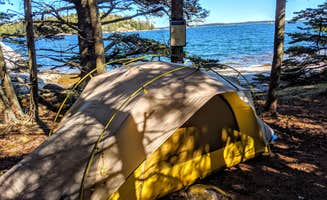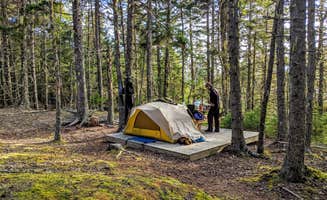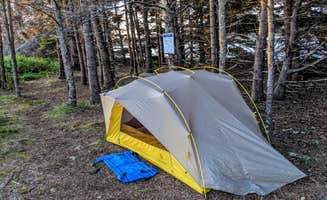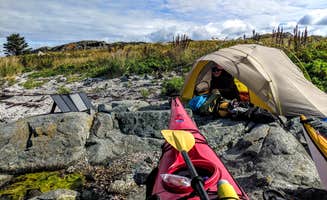Dispersed camping near Blue Hill, Maine centers on four MITA-managed island sites in the Deer Isle Archipelago accessible only by boat or kayak. These primitive campsites operate on a first-come, first-served basis for Maine Island Trail Association members. While these sites offer minimal amenities, they provide exceptional coastal experiences with unique landing conditions that vary by location and tide levels.
What to do
Beach exploration: Marshall Island features the expansive Sand Cove where campers can enjoy beachcombing and stargazing opportunities. One camper noted, "Sand Cove is perfect for a beach fire and stargazing on a clear night."
Stargazing sessions: The dark night skies above Marshall Island provide exceptional celestial viewing conditions away from light pollution. According to reviews, the island offers "some of the best stargazing spots we've ever seen."
Island hopping: Wheat Island serves as an excellent base for exploring Isle au Haut, a remote section of Acadia National Park. "Perfect island for exploring the close-by Isle au Haut, a remote section of Acadia National Park," notes one reviewer who used the island as an alternative to the difficult-to-reserve Duck Harbor Campground.
What campers like
Sunset viewing: Wheat Island's southwest campsite provides panoramic views of the Gulf of Maine at dusk. Campers report "a gorgeous view of the sun setting and full moon rising" from this larger site that accommodates groups.
Easy landing areas: Buckle Island offers accessible shoreline conditions, particularly for novice paddlers. One reviewer commented that "the sandy shore, which is exposed for a good portion of the day, is easy to land on and a short walk to a trail into the woods."
Shell collecting: Doliver Island features a distinctive shell-covered beach despite its limited camping space. A visitor described finding a "gorgeous shell covered beach and a beautiful view of Isle au Haut, just next door" during their stay.
What you should know
Supply planning: No fresh water sources exist on any of the islands, requiring complete self-sufficiency. Campers must pack in all drinking water and cooking supplies. For emergencies, "Swan's Island is a short paddle away and has a very small grocery store and town office with fresh water."
Tide-dependent access: Several islands have challenging landing conditions during high tide cycles. Plan arrivals carefully, as one camper noted about Wheat Island: "This can be a tricky island to land on at high tide, so plan accordingly."
Waste management: Free camping near Blue Hill requires proper waste disposal practices. No toilet facilities exist, so campers must bring waste disposal bags. MITA members frequently perform beach cleanups, with one reviewer noting "if you do a beach clean-up during your stay and send in a picture, you will receive a Maine Coast Heritage Trust hat."
Tips for camping with families
Site selection: Choose larger designated sites for family camping. Marshall Island provides two developed sites near Sand Cove "with a tent platform and a picnic table at each site," making it more suitable for family groups.
Crossing preparation: The 4.5-mile crossing of Jericho Bay to reach Marshall Island requires careful weather monitoring and paddling experience. Using Doliver Island as a staging point can break up the journey, as one experienced paddler shared during "our 9 day journey and a perfect launching spot for crossing Jericho Bay (4.5 miles) to Marshall Island the next day."
Seasonal insect awareness: Mosquito activity varies by island and season. While Marshall Island reportedly had "no pesky mosquitoes" during one September visit, Doliver Island experienced heavy mosquito presence "all day long" during the same period according to the same camper's experience.
Tips from RVers
Boat transportation requirements: No vehicle access exists to any dispersed camping near Blue Hill, Maine. All camping gear must be transported via watercraft suitable for ocean conditions. Consider boat rental services in nearby harbors as alternatives to bringing your own vessel.
Alternative mainland options: For those traveling with RVs, consider using established campgrounds on the mainland as base camps while making day trips to the islands. This approach allows access to the islands' natural beauty without the logistical challenges of overnight stays.





